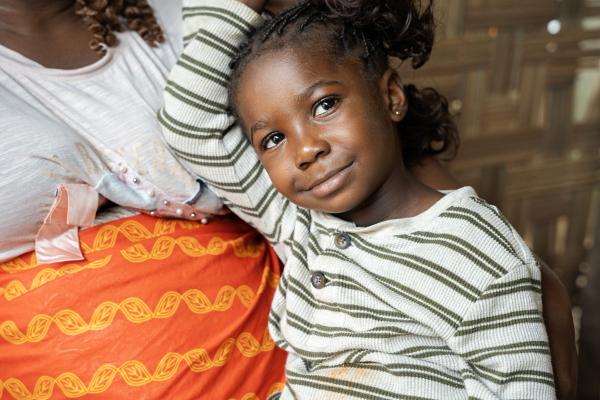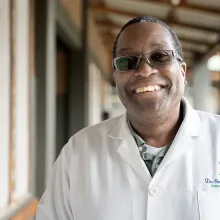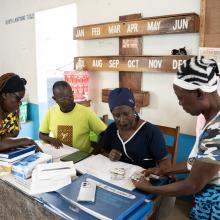Shortly after Dorcas Toe was born in 2021, she faced unusual health challenges early in life. Her grandmother, Evelyn Jugbe, noticed an uncontrollable swelling in Dorcas’ stomach when she was just one week old. “We were wondering what was happening to Dorcas’s stomach, why it [her stomach] was swelling like that,” Evelyn recalled.
“We even thought about trying country medicine (traditional herbs) or taking her to the sick-bush (traditional shrine or herbalist).”
Initially, it was suspected that Dorcas was suffering from flatus (gas in the stomach), and treatments were provided to address the issue. However, her condition worsened, and her stomach continued to protrude alarmingly. By the time Dorcas was one year and six months old, Evelyn could no longer bear to see her granddaughter’s health deteriorate. “Her body was drying up, with plenty of hair, a big stomach, and a small body,” Evelyn said.
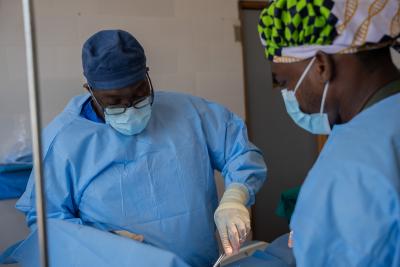
Dr. Sterman Toussaint (left), Partners In Health Chief Medical Officer and Intern Doctor Siafa H. Rogers (Right), performing a surgery at the James Jenkins Dossen Memorial Hospital in Harper. Photo by Ansumana O. Sesay / PIH
Desperate to save her, Evelyn sought advanced medical care. In 2023, she brought Dorcas to the James Jenkins Dossen (JJD) Memorial Hospital, determined to find answers and a solution. Following a thorough medical assessment, doctors diagnosed Dorcas with a congenital malformation of the kidney, a rare and serious condition. Fortunately, the hospital’s medical team acted swiftly, performing a successful surgery that addressed the issue. Dorcas and Evelyn stayed at JJD Hospital for a month before being discharged. Evelyn is grateful that at JJ Dossen hospital, surgery is a right, not a luxury.
“The hospital staff really helped us. They gave us food and took care of Dorcas. They never asked us for one cent; they did it all for free.”
Evelyn observed that Dorcas was among dozens of children and adults at the hospital with similar and other conditions on the ward, many of whom recovered and were discharged before them. She is convinced her granddaughter would not have survived without the significant improvements made at JJD Hospital since Partners In Health (PIH) began working in the county. Prior to PIH’s involvement in Maryland County, 9 out of 10 individuals requiring emergency or lifesaving surgeries, like Dorcas, faced a high likelihood of death or severe disability due to the absence of a surgeon in the southeastern region. Since 2016, PIH and the County Health Team (CHT) have made remarkable advancements to the hospital’s surgical facilities, fostering a safer environment for procedures.
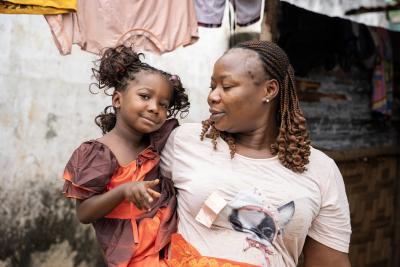
Dorcas’ grandmother, Evelyn Jugbe, holds her in her arm at their home in Pleebo, Maryland County, Liberia. Photo by Luther N. Mafalleh / PIH
Building & Improving Systems Through Lasting Partnership
Addressing systemic challenges, PIH implements innovative rural service delivery, creating a comprehensive health care platform that integrates prevention, diagnosis, treatment, and referrals from community to tertiary levels. These efforts are aimed at partnering with the CHT, the Government of Liberia, and local communities to advance health equity in Maryland County, one of Liberia’s most remote and underserved regions, and beyond.
Additionally, PIH works closely with national institutions such as the Liberian College of Physicians and Surgeons (LCPS) and the William V. S. Tubman University’s Midwifery and Nursing Department to train and equip the next generation of health care professionals.
Reducing Mortality and Disabilities through Improved Emergency Care
Over the past decade, Partners In Health (PIH) Liberia, in partnership with the Maryland County Health Team (CHT), has developed a comprehensive trauma and emergency management system aimed at reducing mortality and disability from trauma-related incidents. Between 2019 and 2024, the emergency room at JJD Hospital handled 3,581 life-saving surgical and trauma care cases across various categories.
Complex general surgeries such as thyroidectomies, mastectomies, splenectomies, complex urethral reconstructions, prostate surgeries, and bowel perforation treatments have been successfully performed. Additionally, over 90 orthopedic surgeries have been completed.
Residents are grateful for the massive improvements at JJD Hospital, which now meets their medical needs, especially in surgery and emergency care. Surgery is not a luxury; it is a necessity and an investment in public health. Yet, in many low- and middle-income countries, surgery is often overlooked. PIH co-founders Dr. Paul Farmer and Dr. Jim Yong Kim famously referred to surgery as the “neglected stepchild of global public health” in a published paper over a decade ago. At that time, basic surgical care was unavailable in Southeast Liberia.
Thanks to the partnership that has made surgery and emergency care accessible at JJD Hospital, lives are being saved. Patients like 35-year-old Patricia Tiady, who underwent surgery for anemia caused by underlying esophageal bleeding, and 27-year-old Abenego Toe (not related to Dorcas), who recovered from blunt chest trauma, are living proof of the hospital’s impact. The hospital’s critical care unit now boasts a survival rate of over 70%. Before PIH, individuals suffering from accidental injuries like stab wounds or broken bones, or mothers needing C-sections, had to travel hundreds of miles to the nearest facility with a surgeon. Many died during the costly and arduous journey, which often took several days due to poor road conditions.
Staff at PIH Liberia vividly recall those days, including one tragic case involving a motorbike rider who arrived at the hospital with a protruding bone and signs of infection. With no surgical team available, he was referred to a clinic ten hours away. Tragically, the van transporting him got stuck, and he died before reaching the hospital.
In 2024 alone, several improvement initiatives were implemented, including four trauma and emergency management training sessions, six basic surgical skills and wound care programs, and two perioperative care training sessions for health care workers in Maryland County. These efforts were further reinforced by ongoing mentorship programs to enhance the quality of surgical care. These efforts and investments have led to the reclassification of the JJD as a regional referral hospital, the only facility where all four core services pediatrics, oxygen, surgery and internal medicine are staffed by consultant physicians.
To further strengthen surgical care at JJD huge investments in surgical supplies and equipment were made to improve access to safe surgery and minimize postoperative complications.
Providing Quality Patient Care at JJD Hospital in Maryland in Southeastern Liberia
PIH and CHT have further expanded services by establishing a functional endoscopy unit, a wound care clinic, and a breast cancer unit. JJD Hospital now serves as the primary surgical referral hub for Southeast Liberia, catering to Grand Gedeh, Sinoe, River Gee, and Grand Kru counties. It has been reclassified as a regional referral hospital, the only facility in the region where all four core specialties—pediatrics, obstetrics and gynecology (OBGYN), surgery, and internal medicine are staffed by consultant physicians.
